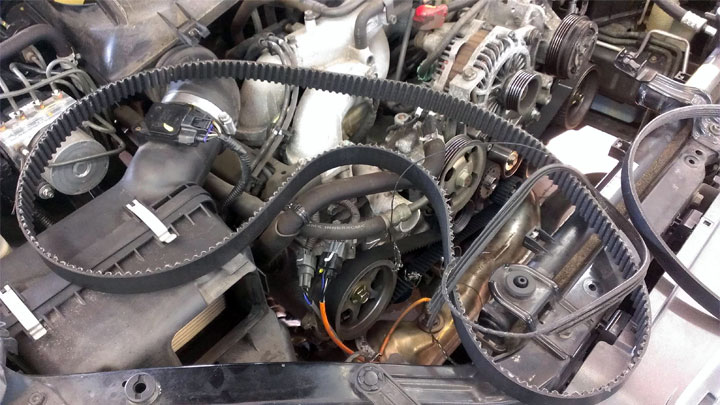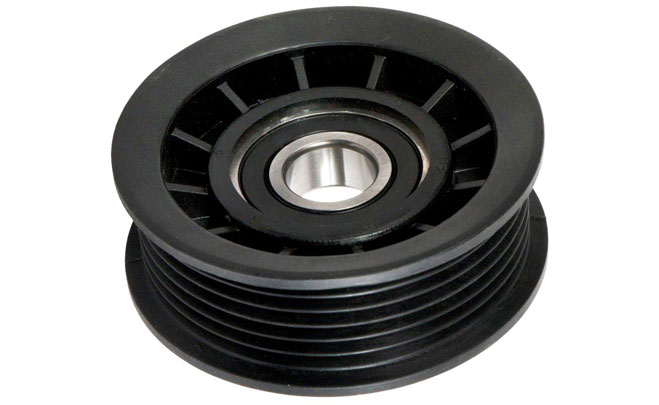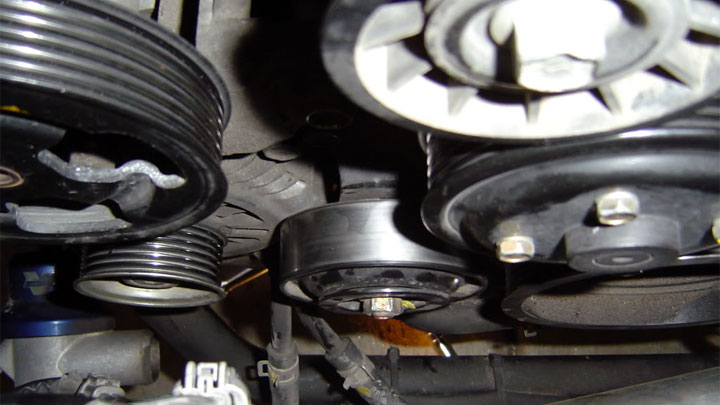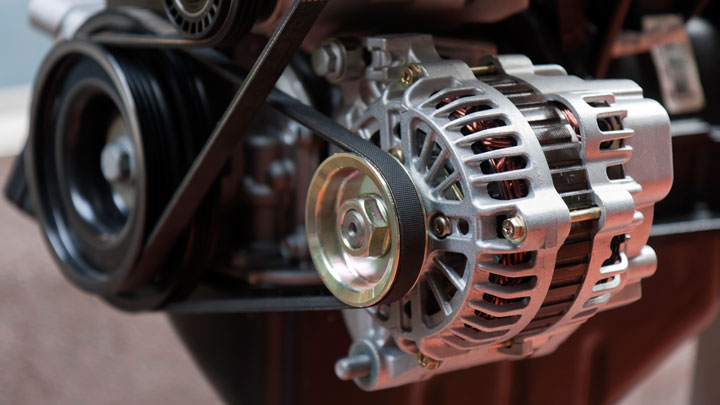Last Updated on December 18, 2020
A car engine consists of drive belts or serpentine belt which runs various accessories that are connected to it, such as the power steering pump, A/C compressor, water pump and the alternator. However, it is important that the belts don’t interfere with other components and belts nearby.
To guide the drive belts, an idler tensioner pulley is used to route them properly around these accessories. This keeps any belts properly aligned and rotating smoothly which ultimately affects the entire internal function of the vehicle.
Most vehicles only need one idler pulley for the engine. In some specialized vehicles, there may be more than one idler pulley. Eventually, the time will come when the idler pulley becomes too worn out or damaged to continue functioning properly.
You will notice when this occurs because there will be various symptoms that will present themselves. One easily noticeable symptom is a squealing or other strange noise coming from the engine area. This will likely be the beginning stages of idler pulley problems or problems with the serpentine belt.
Top 3 Reasons for Idler Tensioner Pulley Noise
When you hear a noise coming from the idler pulley, it can usually be attributed to one of three causes. Your pulley may wear out, slip, or be damaged altogether. Below is a description of each of these causes in the order that you can expect them to occur.
It is important that you pay attention to the noises because they can go from bad to worse. The lighter noise you hear from the first cause should be enough reason to have your vehicle checked by a mechanic.
Otherwise, the noises will get worse and then lead to more serious problems which will cost you a lot more money to get fixed.
#1 – Pulley Old and Worn Out

The idler pulley is constantly spinning along with the drive belt. This creates wear and tear on the pulley after years of doing this repeatedly.
The pulley will develop scuffs and other marks on its surface when this occurs. This is when the noises will begin, although they will be less noticeable noises at this point.
#2 – Pulley Slippage

Idler pulley slippage is likely to follow after it becomes worn out enough. This will cause the pulley to bind and then rub against the engine belt. As a result, there will be squealing noises coming from the engine area that will only get worse until the pulley is replaced.
Not only that, it may also cause other belts and components within the engine to become worn and damaged too.
#3 – Pulley Damage

In extreme situations where the first two causes of idler pulley noise are ignored, the idler pulley will get damaged and ultimately break altogether. The pulley will form cracks and start to break apart a little bit at a time. This will create a chain reaction where the serpentine belt start to tear or completely breaks.
If this happens, then you will have a lot of problems coming from the engine, like stalling and overheating. On top of that, you will have an even louder squealing noise that will be consistent and annoying to everyone in the car and the immediate surrounding area.
Idler Pulley Replacement Cost
Best places to order parts? See: 19 Best Online Auto Parts Stores

The cost to replace the idler pulley of your driver belt will usually be somewhere between $80 and $200. The cost for the new part should only be anywhere from $40 to $90, while the cost of the labor will be anywhere from $40 to $110. These prices do not include added taxes and fees charged by the auto shop.
Overall, this replacement job is not that expensive to get done. Since the drive belts of the engine are dependent on the idler pulley, you cannot afford to postpone replacing this part after it gets worn out.




Hello, I have a 2001 Mercury grand Marquis and my idler pulley just seized up, I immediately drove car home which wasn’t far at all driving it easy and it did not overheat, but after I parked it, I noticed coolant leaking under the engine area, again the engine did not overheat and it looked like the coolant was leaking from a hose behind the water pump so not sure it was damaged or anything else damaged.
You’ll need to pinpoint the exact location of the coolant leak before driving too much further. It could simply be a coincidence, but since the idler pulley failed I am inclined to believe the coolant is coming from the weep hole on the water pump.
Water pumps are designed with a weep hole to inform you the seal is leaking and the water pump is nearing its failure point. It’s best to address this as soon as possible so you don’t overheat the engine.
Before driving again, make sure your coolant is topped up. Check the overflow reservoir to make sure the coolant is at the proper level. Once the engine has cooled completely, check to make sure there is enough coolant in the radiator as well. If you don’t have coolant on hand, you can use distilled water.
Never open a radiator when the engine has been running, as the coolant will be very hot and under pressure! Allow the car to cool completely before touching the radiator cap.
i hear a squeaking or groaning noise when i start my toyota corolla 2010 model and drive for about 5minutes.the noise therefore increases but reduces when i stop the car
Can you tell where the groaning noise is coming from? Does it increase with engine RPM or as you drive faster? Does turning the steering wheel change anything?
I hear a loud noise in my car when my air conditioner is on
But when I turn it off,I don’t hear it,can you help me,please???
Can you please describe the loud noise? Otherwise I’m completely guessing as to what the problem is.
If it’s a loud squeal, your serpentine belt could be loose. If your serpentine belt is in bad shape (cracks or broken ribs), you should just replace it entirely.